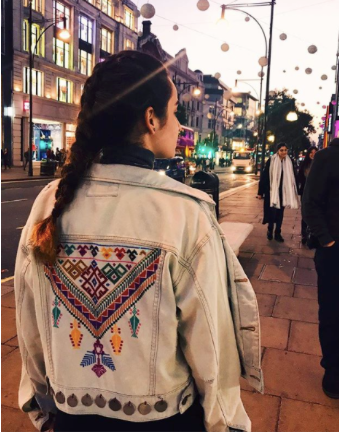
A few years ago, I asked my mother to embroider a denim jacket for me. I have always been very fascinated by the intricacy of Palestinian embroidery, with its various patterns, vibrant colors, and different cross-stitch techniques. My mother and I worked together on designing a pattern and coordinating colors so that the jacket combined both contemporary and traditional elements. My father also contributed to the design by suggesting we add ancient silver coins dating back to pre-1948 historic Palestine. The end result looked so beautiful and I just could not go a day without wearing the jacket. It felt it was such an elegant, timeless piece that I would always cherish and hold dearly because it was a reminder of home.
Every time I wore the jacket, people would stop me on the streets of London and Boston to ask where I got it from. The jacket instantly sparked conversations with a lot of strangers. These discussions I had always paved a way for me to represent my country’s heritage and Palestinian creativity without having to say too many words.
This is when I started realizing the potential that an embroidered garment has in terms of its capacity to draw people in, regardless of their nationality. As such, I began exploring the idea of creating a brand with a social impact. I wanted to make timeless pieces that people from all over the world could appreciate for both their beauty and cultural significance.

The reason I chose to focus my brand around the idea that embroidery has no gender was a result of many experiences, the most interesting being my mother calling me to tell me that a married couple in Gaza walked into an embroidery workshop and everyone was surprised that a man wanted to embroider. Not only that, but everyone was mocking him for the desire to help out his wife, who actually needed him to help out with some embroidery orders because both of them were unemployed.
So, long story short, I asked myself: why can't a man hold a needle and thread? Likewise, why can't men wear embroidered clothing? I felt I needed to do something about it, which is why I started doing research on the topic and I found out that in fact, male Palestinian political prisoners picked up the art of embroidery during their time in Israeli prisons. The prisoners would send the gifts they created to their loved ones, but unfortunately, this habit of crafts-making has declined in the past years because Israel confiscates materials (like thread and needles) that the prisoners use.
Albeit, historically, prisoners have learned this artful skill in a very masculine space that is the prison cell. I believe that the participation of imprisoned men in this form of art should be mirrored across our society so that gender roles attached to who can embroider and who cannot slowly begin to fade. This prison practice serves as an example for men in Palestine to pursue this artistic endeavor without shame. We need to preserve Palestinian embroidery, and to do that, all genders need to participate in taking care of it, learning its in and outs, and exporting it globally. And this is what Anat does.
